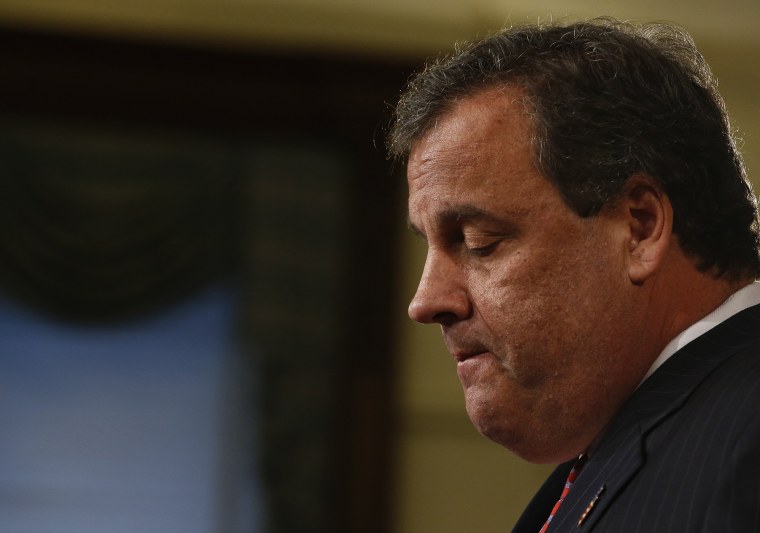New Jersey Gov. Chris Christie (R) addressed his bridge scandal for the first time publicly since yesterday's revelations and announced changes to his team.
New Jersey Gov. Chris Christie apologized to his state's residents Thursday and announced that he had fired a top aide after emails surfaced indicating staffers planned to cause a traffic jam on the country's busiest bridge as part of a political payback scheme to punish a local mayor. "I am embarrassed and humiliated by the conduct of some of the people on my team," Christie said at a press conference in Trenton, N.J. The Republican governor, clearly trying to get in front of a growing controversy, insisted he knew nothing about the scheme and that he was "blindsided."
Specifically, deputy chief of staff Bridget Anne Kelly has been ousted, effective immediately, and Bill Stepien, Christie's campaign manager, will no longer work with the governor at the Republican Governors Association and has dropped his bid for state party chairman.
The press conference, lasting nearly two hours, covered a fair amount of ground, much of which included Christie apologizing and emphasizing how "sad" he is. Indeed, one of the more notable things about the governor's presentation was his willingness to present himself as the victim in his administration's scandal -- he was lied to by those inside his "circle of trust," leaving him "betrayed."
As for who ultimately made the decision to cripple Fort Lee, the governor replied, "I don't know." He also didn't rule out the possibility that political retribution from his administration went beyond this controversy.
Christie also continued to suggest there may have been a legitimate "traffic study," which seems unfathomable given the available evidence, including the fact that his former deputy chief of staff specifically said, "Time for some traffic problems in Fort Lee."
But perhaps the most striking claims today dealt with the culture of Christie's administration. The governor insisted how unusual the misconduct was because, he said, it's not the way his team "conducts itself" and it's inconsistent with the "tone that we've set here." The governor argued he's "not a bully."
The problem, of course, is all of the evidence to the contrary. Christie has earned a reputation as a bully for good reason. Indeed, Kate Zernike reported recently that Christie’s track record of bullying New Jersey officials for even minor slights is extraordinary.
In 2010, John F. McKeon, a New Jersey assemblyman, made what he thought was a mild comment on a radio program: Some of the public employees that Gov. Chris Christie was then vilifying had been some of the governor’s biggest supporters.He was surprised to receive a handwritten note from Mr. Christie, telling him that he had heard the comments, and that he didn’t like them.“I thought it was a joke,” Mr. McKeon recalled. “What governor would take the time to write a personal note over a relatively innocuous comment?”But the gesture would come to seem genteel compared with the fate suffered by others in disagreements with Mr. Christie: a former governor who was stripped of police security at public events; a Rutgers professor who lost state financing for cherished programs; a state senator whose candidate for a judgeship suddenly stalled; another senator who was disinvited from an event with the governor in his own district.
The whole article is worth reading to appreciate just how thin-skinned the governor really is. The piece points to example after example of Christie using the power of his office to punish rivals – even other Republicans – who’ve offended him in minor and inconsequential ways.
The governor obviously doesn't want to be blamed for the Fort Lee fiasco, but looking back over the last four years, the available evidence paints a deeply unflattering portrait of an intemperate bully, willing to use the power of his administration to intimidate, punish, and harass.
